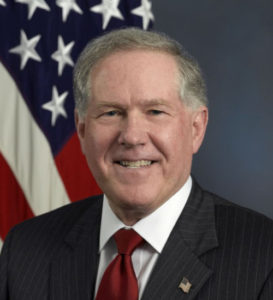We are all too well aware of what happened in March 2020: offices closed, workers were sent home, and businesses across the country were forced into lay-offs. Quest Defense was not immune, and we had to make the hard decision to lay off workers to survive. However, by the spring of 2021, we could bring back the majority of those we had had to lay off in 2020.
So how did we do this?
When we were forced to lay off employees, we expressed our hope that we’d bring them back in the future. We also transparently communicated with the employees who stayed to ensure they understood why our actions were necessary. We then kept a roster of every employee we had to lay off, and when the time came to re-hire their position, we stuck to our promise and made them our first call. By the spring of 2021, we had reached out to every employee we had laid off to check in or offer their job back. More than half of those employees came back.
We have no business without our employees. Whether there is a worldwide pandemic or worldwide peace, leadership needs to prioritize building trust, care, and transparency with our employees every day.
Trust isn’t built overnight.
To understand how our team was able to weather the pandemic, let’s rewind to 2008, the year ASE Technologies was acquired by Quest. At the time, many employees were worried — acquisitions have often led to massive layoffs and plummeting stock prices. However, we actively worked to ensure we did not lose employees during our acquisition, and we still have seven, including our founders. These employees have grown into leadership positions, providing an example to the rest of our team of the kind of care and consideration we prioritize with our employees. This history of loyalty has since built a foundation of trust that helped see us through the pandemic and will continue to bring us forward as we forge ahead into the future.
Keep channels of communication open.
With the prevalence of remote work, it has become much harder to connect with our employees on a day-to-day basis. However, we will not build trust if no one ever hears from us. We hold frequent all-hands meetings and touch base with employees via weekly newsletters. These newsletters come from leaders within our organization and might discuss anything from business performance to social events to employee recognitions. The all-hands meetings and our newsletter show employees that our leaders are not mere figureheads but engaged with their day-to-day.
We also connect out of the office by planning monthly happy hours and other social events. When employees are allowed to connect in a pressure-free environment, they are much more likely to forge genuine connections with their co-workers. These connections form a web throughout the company, creating resilient teams and, thus, a more resilient business.
Listen to your employees.
That said, no newsletter or monthly happy hour will do much good if leaders don’t listen to (and take to heart) employee feedback. The most fundamental aspect of building care and trust with our employees is simple: listen to them.
Quest Global conducts an employee satisfaction survey every new year, and we have an employee satisfaction council that meets every other week. The council works to understand the collective feedback and create tangible action steps in response. We then update our employees at all-hands meetings on the status of the initiatives that were born out of their feedback. It’s not enough to conduct a survey; we need to take action and follow through on our promises. When this happens, employees understand that their needs will be heard and respected by leadership, and they begin to trust the company has their best interest at heart.
Trust is the foundation.
Trust is the foundation of any business — it is what keeps our house standing upright even when there is a hurricane raging outside. And while we can’t predict the future, we can build a team that can withstand even the most challenging of times. When you have the trust of your team, they will not feel scared to follow you forward into the murky and uncertain future. Instead, they will pick up their flashlights, pack some snacks, and get ready to walk alongside you.











 Chris Hardgrave joined Quest Defense in April 2024 as Vice President for Strategic Accounts. He is responsible for sales, growth, and development of strategic relationships for new business development efforts in the Aerospace and Defense sector. Chris works in the Washington, D.C. office.
Chris Hardgrave joined Quest Defense in April 2024 as Vice President for Strategic Accounts. He is responsible for sales, growth, and development of strategic relationships for new business development efforts in the Aerospace and Defense sector. Chris works in the Washington, D.C. office. Steve Gerber is President and CEO of QuEST Defense Systems and Solutions business and is responsible for providing the leadership and growth of this venture.
Steve Gerber is President and CEO of QuEST Defense Systems and Solutions business and is responsible for providing the leadership and growth of this venture. As Chief Engineer for Quest Defense, Jon is responsible for ensuring that sound engineering processes are maintained and followed by our employees working in a diverse set of services and disciplines across all verticals. In this role he also leads Quest Defense’s efforts to develop new methods and technologies to help grow the business through innovation, as well as building and promoting the technical reputation of the company in the public sphere.
As Chief Engineer for Quest Defense, Jon is responsible for ensuring that sound engineering processes are maintained and followed by our employees working in a diverse set of services and disciplines across all verticals. In this role he also leads Quest Defense’s efforts to develop new methods and technologies to help grow the business through innovation, as well as building and promoting the technical reputation of the company in the public sphere. Jeff Fischer serves as a board member for Quest Defense Systems and Solutions business. Additionally Jeff is the Operations Leader for the Quest Global Aerospace and Defense Industry.
Jeff Fischer serves as a board member for Quest Defense Systems and Solutions business. Additionally Jeff is the Operations Leader for the Quest Global Aerospace and Defense Industry. As the President of Quest Global, Bob is responsible for establishing and maintaining senior customer relationships, catalysing new business development, and overseeing innovative and transformational deals. In this role, he also assists in building relationships with strategic acquisitions for the company.
As the President of Quest Global, Bob is responsible for establishing and maintaining senior customer relationships, catalysing new business development, and overseeing innovative and transformational deals. In this role, he also assists in building relationships with strategic acquisitions for the company. Joe supports Special Missions across Quest Global to include key client contract negotiations, strategic business solutions, M&A, and culture endeavors.
Joe supports Special Missions across Quest Global to include key client contract negotiations, strategic business solutions, M&A, and culture endeavors.
 John Thackrah is the founding Principal of Sextant Solutions LLC, an aerospace, maritime and government acquisition consultant.
John Thackrah is the founding Principal of Sextant Solutions LLC, an aerospace, maritime and government acquisition consultant. Frank Kendall is an independent consultant to defense industry firms and non profit research organizations. He is a Senior Fellow at the Center for American Progress, a Senior Advisor to the Center for Strategic and International Studies, and a member of th e Council on Foreign Relations. Among other industry positions, he is a member of the board of directors of Leidos Corporation and of Leonardo Electronics USA Inc. From 2012 to 2017, Mr. Kendall served as the Under Secretary of Defense for Acquisition, T echnology and Logistics (AT& after serving as the Principal Deputy Under Secretary from 2010 2012. Mr. Kendall has over 45 years of experience in engineering, management, defense acquisition, and national security affairs in private industry, governmen t, and the military.
Frank Kendall is an independent consultant to defense industry firms and non profit research organizations. He is a Senior Fellow at the Center for American Progress, a Senior Advisor to the Center for Strategic and International Studies, and a member of th e Council on Foreign Relations. Among other industry positions, he is a member of the board of directors of Leidos Corporation and of Leonardo Electronics USA Inc. From 2012 to 2017, Mr. Kendall served as the Under Secretary of Defense for Acquisition, T echnology and Logistics (AT& after serving as the Principal Deputy Under Secretary from 2010 2012. Mr. Kendall has over 45 years of experience in engineering, management, defense acquisition, and national security affairs in private industry, governmen t, and the military. Page Hoeper is a private consultant, corporate director, and venture capitalist. Since leaving government service, Mr. Hoeper has focused on corporate governance and board service. He chairs the boards of OnPoint Technologies, Inc., 501c(3) venture capital fund established by Congress to focus on emerging commercial technologies of interest to the U.S. Army, and Quest Defense Systems & Solutions, a provider of engineering services to the U.S. defense industry.
Page Hoeper is a private consultant, corporate director, and venture capitalist. Since leaving government service, Mr. Hoeper has focused on corporate governance and board service. He chairs the boards of OnPoint Technologies, Inc., 501c(3) venture capital fund established by Congress to focus on emerging commercial technologies of interest to the U.S. Army, and Quest Defense Systems & Solutions, a provider of engineering services to the U.S. defense industry.